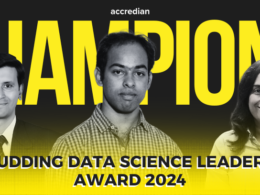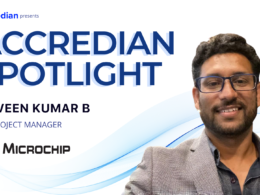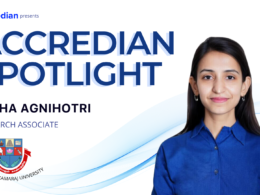Accredian’s Spotlight story today is on Susmita Chakravorty, an Astrophysicist who is keen on transitioning to the field of data science. Sushmita’s background in astrophysics has given her a solid foundation in scientific research, data analysis, and mathematical modeling. With her passion for learning and problem-solving skills, Sushmita is ready to embark on a new journey in the field of data science.
Question 1: Which program & batch are you part of at Accredian & tell us more about your current work profile?
Susmita: I belong to the August 2021 cohort. Currently, I am currently on a break as I used to work as an Astrophysicist and I’m now looking to transition into the field of Data Science. I was actively seeking a job and needed Accredian’s help in determining whether I should position myself as a fresher or use my 17 years of national and international work experience to target a mid-level job.
Question 2: Walk us through your career journey & what got you interested in Data Science & Machine Learning?
Susmita: I completed my bachelor’s and master’s degrees in physics from Calcutta University, followed by a PhD in astrophysics from the Inter University Center for Astronomy, Astrophysics, India.
After my PhD completion, I went to Harvard University in Cambridge, Massachusetts, USA, and IPAC in Grenoble, France. I declined an assistant professor position at IIT Kharagpur and joined the Indian Institute of Science (IISC) as a national Postdoctoral Fellow.
While there, I realized that continuing in academia would not provide the growth and challenges I sought. I decided to transition to data science, which offered a similar workflow to my astrophysics research. I am now a part of Accredian’s program that provide the perfect curriculum and structured approach, I am satisfied with my decision.
Question 3: What all tools and packages in Data Science & Machine Learning have you mastered in your Data Science & AI program at Accredian so far?
Susmita: I have mastered basic Python using NumPy and Pandas, and found Tableau easy to use. I enjoy data science and AI concepts, particularly the mathematically rigorous aspects of Artificial Intelligence. However, I have not been consistent with my project work, and plan to catch up in the next three months.
Question 4: What are some of the initial challenges when you got started on your Data Science journey and how did you overcome it?
Susmita: I find it difficult to stay motivated and disciplined while looking for a job, doing projects, and updating my LinkedIn and GitHub profiles, even though I have received guidance from Career Launchpad.
While I excel at coding and mathematical concepts, I struggle with staying active in hands-on work. I upgraded to PGP DSAI for personalized career counseling and have already had one session with my mentor Manjusha, who provided a step-by-step approach to overcoming this challenge. Although I’m not yet satisfied with my progress, I hope to catch up in the next month or two.
Question 5: Who is your favorite faculty at Accredian and what did you learn from him the most?
Susmita: I cannot pick a favorite among my three favorite teachers: Suchit Mazumdar, Deepesh Wadhwani, and Shubhodeep Dey.
So, Suchit, what I learned from him is that to be efficient, one should not delve into unnecessary details and rigor while coding. I think this is especially important for someone like me who was in academia, where we were taught to go too deep. However, the industry needs efficiency and timely functioning more than just going deep. So, from Suchit, I learned to prioritize efficiency and avoid overcomplicating things.
From Deepesh, I learned the nuances of applying methods and algorithms, particularly in the field of data science. He taught us about the different nuances present in all algorithms and stressed the importance of thinking before blindly applying data science algorithms.
And from Shubhodeep, I thoroughly enjoyed his artificial intelligence courses because they were more mathematically rigorous, which appealed to me. His approach involved understanding and connecting the requirements of the business with mathematical rigor, constantly looking for ways to improve algorithms, and exploring opportunities to get patents.
Overall, all three of them are wonderful teachers and have taught me valuable lessons that I will carry with me throughout my career.
Question 6: What is the goal of Data Science?
Susmita: The goal of data science is to maximize revenue from human behavior as human-generated data is predicted to be the most valuable resource driving the global economy in the future.
Question 7: In your view, how has Data Science evolved in last few years?
Susmita: Data science has evolved through the connection of human behavior to the cloud, enabling the recording of all human behavior, which can be analyzed to predict product development, sales strategies, and stakeholder engagement.
The ability to connect human behavior drives technological development, and hardware and software advancements are also necessary to process the vast amount of available information. The ability to process all of this information in data science has led to mind-blowing advancements in hardware and software, allowing business stakeholders to take their game up several notches.
In principle, all human behavior can now be recorded, and as a result, it is possible to connect all the dots and predict things like what movies to make, what products to make more of, and which ones to make less of. Additionally, it is now possible to sell products to different people and stakeholders more effectively.
Question 8: What are the current trends in Data Science that you are most excited about?
Susmita: So, what am I most excited about in data science? Well, to be honest, I am both excited and terrified. About a decade ago, Bill Gates was asked what humans should be concerned about in the next decade, and his answer was the loss of privacy. As the CEO of Microsoft, he understood the concerns about privacy as his company is one of the giants who are building all data science and artificial intelligence products.
Every detail of our lives, from the groceries we order to the movies we watch and the places we travel, is online, and it can be accessed by someone with ill intentions. Although this information can be used for good, such as Google Maps showing us the least congested route during traffic, it can also be used against us.
However, I’m still excited about the potential of data science to make a positive impact on the world. I hope that this technology will continue to be used for good rather than harm in the future. As long as we keep our focus on the benefits of this technology, I am excited to see what the future holds.
Question 9: Which are some of the blogs that you follow?
Susmita: Blogs. This is an area related to a motivated and disciplined approach towards data science job search, which I have not done well. So, I do not really follow any blogs yet.
But Manjusha has given me a list of blogs on Accredian, I have used the list given on LinkedIn by Manjusha, which contains the 10 most influential blogs in Data Science and AI, and I have connected with all of them.
In LinkedIn, seven of them have accepted my request, but three of them have not. So, I go through LinkedIn, and whichever article catches my eye, I read them. It’s not that I’m not informed at all, but I do not do it in a systematic and fast fashion yet. So, I cannot really name one. But this is an area where I want to improve in the next one or two months.”
Question 10: What is your advice to anyone wanting to start a career in Data Science?
Susmita: Anyone who wants to migrate to data science, I think it’s a good idea. Data science is, in any way, what is controlling your life, whether you know it or not. So it is better to be part of that process rather than remain ignorant. That’s a philosophical point of view.
From your point of view, it uses really cutting-edge technology, software, hardware, algorithms, you name it. It is using the most advanced forms of all those to do jobs, which often help people rather than not. So it’s an exciting field to work in. This is the field that will grow. This is the field that will take your career forward.
So I think it is a very good idea to join this and continue to move. If you get one kind of data science job, don’t just stop there because that kind of job will gradually vanish; it will just mold into something else. So continue to mold yourself along with the field.
But my word of caution in the process of preparation for the job is that you have to dedicate time to work on this. Just joining a program is not going to get you that job. You definitely need to spend half an hour to one, depending on your skill set and level of maturity, to prepare yourself so that you get the coveted job.
We hope you enjoyed reading this interview. Check out the Accredian Spotlight for more interesting student stories like this.





